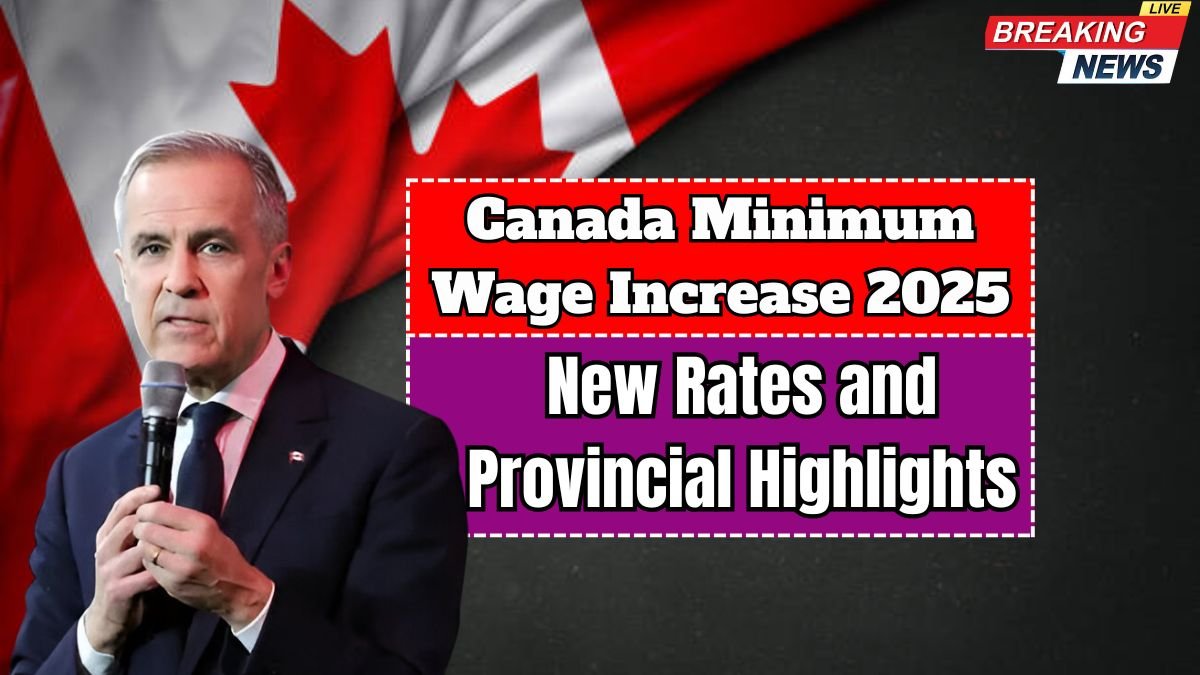Every year, millions of employees and thousands of small and large businesses in Canada track the changes in minimum wage wage,and the reasons are obvious wage,obvious inflation, rent increases, the price of basic goods, and the cost of living are ever-increasing, which in turn directly affects people’s wallets when a change is made to the minimum wage.
In 2025, Canada will also see numerous important provincial adjustments to increase the minimum wage.This article will examine the 2025 Canada Minimum Wage Increasewage asminimum wage increase by looking at which provinces increased it and by how much, which sectors are most affected, and what the improvements and challenges to workers and businesses may be.
Why is the 2025 Canada Minimum Wage Increase Important?
Canada has been facing increasing inflationary pressures for several years Specifically:
- Rapidly rising rental rates
- Continuously rising grocery prices
- Increasing gas, electricity, and heating costs
- Higher-than-normal household costs
Increasing the minimum wage under these circumstances is not just an economic decision, buprovince minimum wagedecision butt an important part of social security
The 2025 wage increase is significant because:
[also_read id=”3126″]
- Inflation (CPI) was higher than expected in 20242decision but024.
- Low-wage workers faced the greatest pressurep2024.ressure.
- The government is updating wage rates based on the “region-wise cost of living” this time.
- Therefore, the 2025 minimum wage hike is considered more balanced and region-specific than in previous years.
What will Canada’s minimum wage be in 2025?
Every province and territory has its own minimum wage. Most provinces have disclosed increases for 2025, while some provinces have made automatic changes to minimum wage based on inflation Generally, in 2025, the minimum wage will range between pressure
- $15.30 to $17.50 (depending on the province)
- Moreover, provinces like British Columbia and Yukon already have the highest minimum wages in Canada.
- While provinces like Saskatchewan are continuing with the gradual minimum wage increases.
Province-Wise Minimum Wage Highlights 2025 (Provincial Breakdown)
This section is extremely useful in the blog because readers need information specific to their province. Below, the provincial highlights for 2025 are explained in human-style.betweenhuman style.
Ontario – Wage Growth Continues
- Ontario is Canada’s largest province, and its minimum wage changes annually based on CPI.
- 2025 Projected Wage: $17.20–$17.45 per hour
- This increase is considered sufficient to cover rent and grocery inflation.
- The new rates will also apply to students, part-time employees, and servers/tipped workers.
British Columbia – Highest-Paying Province
- BC is already known as a high-income province, and its minimum wage is among the highest in Canada.
- 2025 Projected Wage: $17.90–$18.10 per hour
- This increase is in line with BC’s rising rents and cost of living.
[also_read id=”3054″]
Alberta – Stable but Slow Growth
- The wage rate in Alberta has remained relatively stable for several years, but a slight increase is expected in 2025.
- 2025 Projected Wage: $16.10–$16.30 per hour
- Alberta’s economy is based on the oil and gas sector, so wage policies remain fairly balanced.
Saskatchewan – Gradually Rising
- Saskatchewan has been the province with the lowest minimum wage in Canada.
- 2025 Projected Wage: $15.30–$15.50 per hour
- While this is still lower than many provinces, it is a significant increase compared to 2024.
- An increase in the minimum wage always brings relief to workers, especially those in low-income jobs.
What impact will it have on businesses?
The Minimum Wage Increaseprovince.minimum wage increase doesn’t just affect workers,minimum wage increaseworkers; it also impacts businesses sometimes positively, sometimes challenging
Challenges for small businesses:
- Staffing costs will increaseiworkers;ncrease
- Profit margins may decreasedincrease.ecrease.
- Retail and hospitality sectors will be more impactedidecrease.mpacted.
But also positive effects:
- Staff retention will improveiimpacted.mprove.
- Attracting skilled workers will be easiereimprove.asier.
- Employee satisfaction will increaseieasier.ncrease.
- Increase productivitypincrease.roductivity.
- Many experts believe that the long-term impact of wage increases on the economy is positive.
Will the 2025 Minimum Wage increase further increase inflation?
[also_read id=”2996″]
- There may be a short-term inflation impact.minimum wage increase
- But in the long term, wage increases increase economic activity
- Higher wages mean more spending, which strengthens the economy.activity.
- Therefore, wage increases are believed to lead to balanced economic growth.
Which sectors will be most affected by the 2025 minimum wage increase?
- The sectors most affected are
- Restaurants and fast food
- Hotels and hospitality
- Retail stores
- Home care and personal support
- Delivery jobs and the gig economy
These are wage-driven industries, so changes here will have an immediate impact.
Where is the minimum wage headed in Canada in the future?
Experts project trends to 2025, suggesting that:
- The national average minimum wage could rise to $18–$20 per hour in the next 3–5 years.
- Many provinces are adopting automatic wage revisions based on the CPI.
- Living wage movements (fair wage campaigns) will become stronger.
Therefore, Canada is moving towards a more equitable wage structure in the coming years.
Conclusion
The 2025 Canada minimum wage increase is an important step for workers Amidst rising pressures from inflation, rent, and essential expenses, this increase will provide financial stability and relief to many families While some challenges exist for businesses, overall, this change is considered healthy and positive for Canada’s economy, markets, and work culture This minimum wage increase moves Canada toward a better, balanced, and equitable employment market for all.
FAQs
Q1. When will the new minimum wage rates take effect in Canada in 2025?
A. Most provinces will implement the updated minimum wage rates starting October 1, 2025, while some may apply changes earlier based on local rules.
Q2. Will all provinces in Canada increase the minimum wage in 2025?
Yes, almost all provinces and territories are expected to adjust their minimum wage rates in 2025, though the rate of increase varies regionally.
Q3. Who benefits from the 2025 minimum wage increase in Canada?
A. The wage hike benefits full-time workers, part-time employees, students, and hourly workers across sectors, especially in retail, hospitality, and service industries.



